20 Years of Riot Police Force in Croatia Marked
ZAGREB, 17 Sept 2021 - The riot police force is celebrating 20 years since its establishment and in addition to officials from the Ministry of the Interior and Police Directorate, the director of Germany's riot police, Andreas Backhof, attended the celebrations in Zagreb on Friday.
Croatia's riot police force was established on the German model.
Inspector Backhof said that Croatia's riot police meet European standards at a very high level. He underscored that other countries seek advice from Croatia's police when establishing their own police units, which, he said, deserves great respect and recognition, the Ministry said in a press release.
"We have stood and will stand by you, with advice, action and support - all this time we have been learning from you too. We have not only maintained our partnership on an equal footing but have developed friendly relations based on mutual respect and trust," said Backhof.
Interior Ministry state-secretary Irena Petrijevčanin Vuksanović said that compared to previous years, the need to involve riot police in various daily tasks had increased and the scope of their duties had significantly expanded.
Police Director-General Nikola Milina thanked all members of the riot police unit, underscoring that along with the special police unit, riot police conduct the most difficult duties. He recalled that the riot police actively participate in a wide range of police activities, emphasising their engagement in the protection of Croatia's border - the longest external EU border.
The ministry recalled that in addition to their regular duties riot police participate in complex criminal-tactical situations such as police hunts, inspections of premises, ambushes, raids, road blockades, etc.
Riot police are also called in in cases of general danger caused by natural disasters and in all other situations where the presence of a large number of police officers trained to conduct teamwork is required, the ministry said.
For more news, CLICK HERE.
Police File Reports Against Eight Anti-Maskers in Krapinske Toplice
ZAGREB, 15 Sept, 2021 - Police in the northwestern Krapina-Zagorje County have filed misdemeanor charges against eight persons protesting outside a primary school in Krapinske Toplice against the obligation for children to wear face masks in school.
The police have filed 26 reports and they refer to an attempt to disturb the public peace, unreported public assembly in a place where public assemblies are not allowed, refusal to wear a protective mask indoors, and refusal to show police one's ID card.
Police also reported that a child's parents were reported for offences against the Identification Card Act and the Act on the Protection of the Population against Infectious Diseases, and that the competent social welfare service had been informed accordingly.
Police said that over the past few days, several people had continued rallying outside the school in Krapinske Toplice in violation of the Public Assembly Act, which was why police presence there was required.
For more about politics in Croatia, follow TCN's dedicated page.
Brits Film Croatian Officials Asking for Nonexistent Fee Payments
September the 5th, 2021 - There's bad promotion and there's bad promotion. Unfortunately, it's difficult for it to get much worse than this for the country's nautical tourism as Croatian officials are secretly filmed by some British tourists asking for the payment of fees which don't even exist.
As Morski writes, after the recent scandal from the Slavonski Samac border crossing, where two Croatian customs officers asked for a bribe from a foreign tourist, another scandal related to bribes this time involving other Croatian officials managed to remain outside the Croatian media space - until now that is. The location is Dubrovnik, the month is July, and two British sailor bloggers used a hidden camera to film Croatian officials charging them non-existent fees.
The British informed the Croatian Ministry of Tourism, which confirmed that the officials in question had indeed deceived them.
Carefree sailing along the Croatian coast for a pair of British sailors turned into a first-class scandal, which was documented and published on their YouTube channel and on a website that brings together sailors. It all happened back in July this year when the British couple went to the authorities located in Dubrovnik to announced their departure from Croatian waters, with the aim of continuing their journey down south to nearby Montenegro.
It seems innocent enough, but when they got to speak to the Croatian officials, they fined them the equivalent of 100 pounds because they allegedly failed to pay the additional sojourn tax. The police didn't explain to them exactly what the fee in question was, but the British sailors had to pay it. And in cash.
The sailors state that after this odd incident they contacted the Croatian Ministry of Tourism regarding the disputed payment, and they were told in an official response that there is no such sojourn tax or legal article that obliges boaters to pay such fees. In other words, the Croatian officials based in Dubrovnik robbed them. The British tourists naturally demanded a refund.
''I have to admit that this event left a bitter taste in my mouth. While we were sailing towards Montenegro, we agreed that we'd never return to Croatia again,'' the unsurprisingly indignant British woman said in her video.
The video's description reads: ''It was a shock to be threatened with arrest and have our passports taken away when trying to check out of Croatia. We have had problems before with Croatian officials but we really didn't expect this level of illegal activity'' which is damning for Croatian nautical tourism, which is otherwise very popular. The comments below are also from people who are now reconsidering paying the Croatian coast a visit.
Watch the video in full below:
The Ministry of Tourism was then asked to provide a comment on this case, as their services had indeed responded to the British tourists in question that the tax they had to pay to the officials did not even exist. Attempts have also been made to find out whether the individuals working for the police in question were properly punished for extortion, but no response has been received yet.
An initial report stated that the officers involved were customs officers, but that was swiftly corrected by Croatian customs, who stated that they have nothing to do with foreign nationals and their notifications about leaving Croatia, and that this was a matter involving the police, not them.
It is also important to note that Croatian customs officers operate under the Ministry of Finance, and not under the Interior Ministry (MUP), like the police do.
For more, make sure to follow our lifestyle section.
Croatian Police Discover Over 700 Fake PCR Tests So Far This Year
ZAGREB, 19 July 2021 - So far this year, Croatian police have discovered over 700 forged PCR tests, but no fake EU digital COVID certificates.
By 14 July this year, a total of 703 counterfeit PCR tests have been discovered, mostly in Vukovar-Srijem County (251), Slavonski Brod-Posavina County (134), Istria County (95), and Split-Dalmatia County (64), the Ministry of the Interior said on Monday.
Last week, police found 26 persons, including 13 minors, trying to enter a football stadium in Split with fake PCR tests. In late May, in Primorje-Gorski Kotar County, 26 people were discovered in the process of forging PCR tests and most of them were foreign nationals.
At several border crossing points, PCR tests shown by foreign nationals turned out to be forged. Among the foreigners with forged tests were citizens of Bosnia and Herzegovina, Brazil, the Netherlands, North Macedonia, Austria, Albania, Kosovo, the Czech Republic, Italy, Montenegro, Sweden, the United Kingdom, Germany, Hungary, Serbia, and Slovenia. Croatian citizens are also known to have used forged PCR tests to enter the country or to have the self-isolation order lifted.
Some of the foreign nationals admitted that they found a negative PCR test online and then made an effort to put their own details in it.
The police say that so far they have not encountered any forged EU digital COVID certificates nor do they have any records of their misuse.
For more news about Croatia, click here.
The Guardian: Croatian Police Accused of Sexually Abusing Afghan Woman
ZAGREB, 7 April, 2021 - A woman from Afghanistan claims that she was sexually abused by Croatian border police, and even held at knifepoint, after crossing the border, the Guardian said on Wednesday.
According to a dossier from the Danish Refugee Council (DRC), the incident occurred on 15 February, in Croatian territory, a few kilometres from the Bosnian city of Velika Kladuša, the British newspaper said.
In the report the woman said she tried to cross the border with a group of four others, including two children, but they were stopped by an officer who allegedly pointed a rifle at them.
The Afghans asked for asylum, at which one of the officers laughed, after which the woman was singled out for a search, the Guardian said, quoting her as saying that she insisted that he should not touch her because she was a woman and a Muslim, after which the officer slapped her.
The officer allegedly touched her breasts and behind, and ordered her to remove all her T-shirts, which she refused. The five migrants were then taken away in a police vehicle, after which the police again hit the Afghan woman, ordering her to strip naked and starting to sexually abuse her, at one point putting a knife to her throat.
The police physically assaulted other migrants from the group as well, and ordered them to walk back to Bosnia and Herzegovina, the Guardian said.
It added that the European Commission condemned this alleged act and called on the Croatian authorities to investigate all allegations and punish those responsible.
DRC secretary general Charlotte Slente was quoted as saying that despite the Commission’s engagement on the migrant issue on the Croatian border, there had been no progress in recent months either in investigations of reports of brutal treatment by police or in the development of independent border monitoring mechanisms.
According to the Guardian, the Croatian Interior Ministry said there were no recorded dealings with "females from the population of illegal migrants" on the day in question and that Croatian police, by saving the lives of hundreds of migrants from minefields, rivers and snow, showed not only an organised and professional approach in the protection of the state border but humanity as well.
The Interior Ministry says the Croatian police are persistently portrayed as brutal without a single piece of evidence and that illegal migrants, when they fail to cross the border, are ready to falsely accuse those same police of abuse, the Guardian said.
According to the DRC, since May 2019 almost 24,000 migrants have been illegally pushed back to Bosnia, including 547 between January and February 2021.
For more about violence against migrants in Croatia, follow TCN's dedicated page.
1129 Brand New Traffic Cameras Coming to Croatian Motorways
March the 19th, 2021 - Over one thousand brand new traffic cameras are due to grace Croatian motorways, adding an additional deterrent to those considering speeding or reckless driving.
As Poslovni Dnevnik writes, driving in the wrong direction, pedestrians or a stopped vehicle on the road are just some of the traffic hazards about which the state-of-the-art automatic incident detection system (AID) procured by Croatian Motorways will alert HAC employees working in traffic control centres in just a few seconds, according to a report from Vecernji list.
Subsequently, additional cameras will be installed for this purpose on Croatian motorways, more specifically on the sections of the Rijeka - Zagreb and Rijeka - Rupa motorways, given that the company ARZ has been merged with HAC.
The total value of this procurement is estimated to stand at approximately 55 million kuna. The AID system detects when an incident happens and generates an alarm just a few seconds after the incident occurs, allowing the operator to do what is needed to prevent a secondary incident.
The AID triggers an audible alarm in the event, automatically displays the scene of the incident on the road to the operator and records everything happening, and the cameras also cover a minimum of three traffic lanes and one stop lane.
In addition to the incidents already mentioned, AID warns of traffic congestion, slow vehicles and any loss of normal levels of visibility. An alarm sounds in the tunnel when the loss of visibility of the cameras is detected by the appearance of smoke due to a fire having broken out somewhere nearby.
The system set to be placed along Croatian motorways can also collect data on vehicle classification, average speed, travel time, vehicle distance and more. The new traffic cameras will have a motorised varifocal lens, an IR reflector, and will have the ability to minimum 25 frames per second.
HAC has a Central Centre for the Supervision and Management of Motorway Traffic connects all regional Croatian motorway traffic control and management centres (RCNUPAC).
For the latest travel info, bookmark our main travel info article, which is updated daily.
Read the Croatian Travel Update in your language - now available in 24 languages.
Croatian Police and Deminers Rescue Several Migrants From Minefield
ZAGREB, 5 March, 2021 - Police and deminers yesterday and today rescued several illegal migrants whose lives were in jeopardy in the mine field in Saborsko municipality, after one migrant was killed and several sustained injuries in a landmine blast, the Interior Ministry (MUP) said on Friday evening.
Members of Lučko Anti-Terrorist Unit yesterday searched the area by helicopter and then warned migrants that they were in a mine suspected area and should stay in place until help arrives. Deminers of Lučko Anti-Terrorist Unit this morning started to inspect the field and create a safe corridor for evacuation and ten persons were rescued and offered medical help.
MUP said in the press release that a group of foreign nationals had illegally reached Croatia and entered a mine suspected area in a forest area in municipality Saborsko. There, a younger man stepped on an unidentified explosive device and died, while other persons from the group sustained injuries in the blast. After receiving a report, police officers found one man dead and one injured, while the rest of the group went away in unknown direction.
According to the interior ministry, at the moment six persons have an intention to make an application for international protection in Croatia, while other persons are in medical care due to having sustained injuries.The life of one of them is in danger.
The Ministry of the Interior and Croatian police, it is recalled, have been intensively underscoring the dangers of illegal migrations since 2018, especially warning of the danger of mine suspected areas, severe winter conditions in the mountains and rivers.
VIDEO: Prohibition-Era Nightclubbing Zagreb, 33 Fined
January 29, 2021 – It has all the ingredients of a movie about Al Capone or Lucky Luciano in 1920s Chicago - illicit, hidden drinking dens, dancing girls, bullets, guns, gangsters and a police raid, only with a neon lighting scheme that remains fashionable strictly in Balkan clubs. Welcome to Prohibition-era nightclubbing Zagreb
It has all the ingredients of a movie about Al Capone (main picture) or Lucky Luciano in 1920s Chicago - illicit, hidden drinking dens, dancing girls, bullets, guns, gangsters and a police raid, only with a neon lighting scheme that remains fashionable strictly in Balkan clubs. Welcome to Prohibition-era nightclubbing Zagreb.
Croatian police have issued a video of a raid they undertook to shut down a Prohibition-era nightclubbing party in Zagreb. Inside the venue, they found 33 persons. None were wearing masks.
One young man at the party was caught with a pistol and bullets. If it weren't for the police's modern helmets with visors and the Balkan-cool neon lighting, you could be forgiven for thinking you were watching Eliot Ness and The Untouchables busting an illegal speakeasy. All cafes, restaurants, bars and nightclubs are supposed to be closed at the moment under measures adopted to counter the spread of Coronavirus.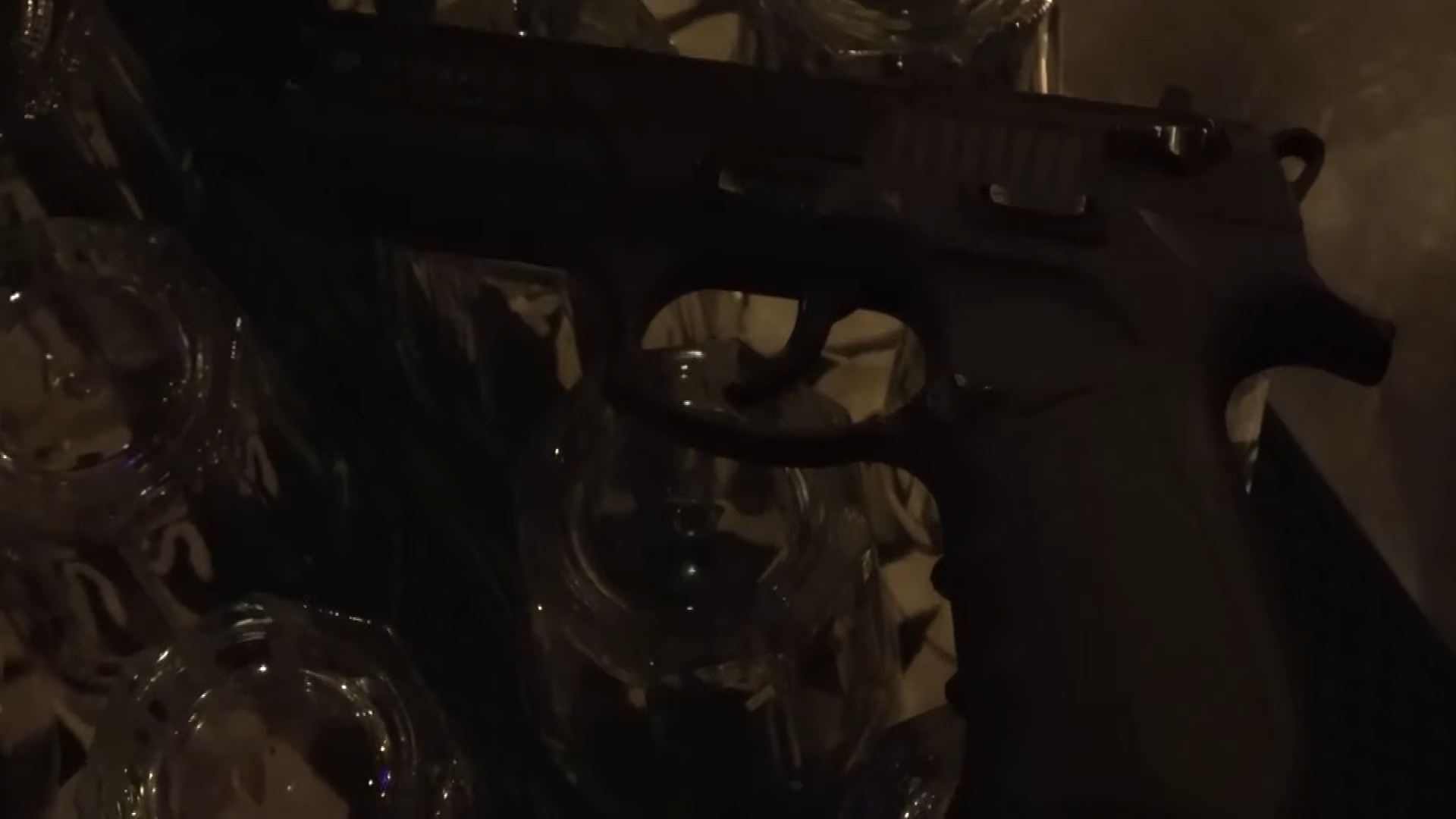 The pistol found by police while conducting a search on a 24-year-old at the club - Youtube screenshot
The pistol found by police while conducting a search on a 24-year-old at the club - Youtube screenshot
In the original era of America's Prohibition, under which the production, import, transportation, and sale of alcoholic beverages was illegal, Al Capone ultimately received an 11-year prison sentence for tax evasion and Lucky Luciano was looking at 30 - 50 years until he struck a deal and agreed to be deported to Italy. Thankfully, there are no mafia murders connected to this tale of Prohibition-era nightclubbing in Zagreb.
In addition to the video, the police released a statement about the prohibition-era nightclubbing raid:
"During the operation, a total of 33 people were found, identified and checked in said facility. No coercive measures were used during the actions of the police officers. 33 people were found not wearing protective masks, which is why the police officers issued them three Notices of Misdemeanor and 30 fines were collected for violations of Article 47, paragraph 2, item 9 of the Law on the Protection of the Population from Infectious Diseases.
Furthermore, for one of the caught persons, a 24-year-old was searched and a gas pistol was found in his possession, for which he was issued a Mandatory Misdemeanor Order for the offence under Article 27, paragraph 2 of the Law on procurement and possession of weapons by citizens. Bullets found by the police at the prohibition-era nightclubbing scene in Zagreb
Bullets found by the police at the prohibition-era nightclubbing scene in Zagreb
Also, officials of the Directorate of Civil Protection found violations of epidemiological measures contrary to the Decision on necessary epidemiological measures restricting gatherings and introducing other necessary epidemiological measures and recommendations to prevent the transmission of Covid-19 through gatherings. Due to performing catering activities contrary to the decisions of the Civil Protection Headquarters, officials of the State Inspectorate, Tourist Inspection, Zagreb Regional Office found a violation of Article 9A of the Catering Act and issued an oral decision banning the work, and the facility was sealed for at least 30 days. Misdemeanor proceedings will be initiated against the legal and responsible person.
As part of the criminal investigation, the 45-year-old owner of a catering facility was taken to the official premises of the Zagreb Police Administration for a criminal investigation on suspicion of having committed the criminal offence of "Spreading and Transmitting an Infectious Disease" under Article 180. He will be handed over to the custody supervisor after the criminal investigation is completed”
Prohibition in the United States took place in a 13 year period between 1920 and 1933. It is highly unlikely that the bars and cafes of Zagreb will be asked to remain closed for such a length of time. This is not the first instance of Prohibition-era nightclubbing taking place irrespective of epidemiological guidelines in Zagreb. In late November 2020, Croatian media (including Juarnji List) widely reported on police raids that took place at two Zagreb venues, even though measures adopted in the fight against the pandemic were at that time more relaxed.
45 People With Fake PCR Tests Detained At Croatian Border In One Weekend
January 19, 2021 – 45 people tried to enter Croatia with fake PCR tests this weekend alone. They were caught by Croatian police, detained at the border and reported to the State's Attorney office. If found guilty, each faces a maximum penalty of three years in prison
Some 45 people tried to enter Croatia through the borders of one county with fake PCR tests this past weekend.
Travel from Bosnia and Herzegovina into Croatia currently requires the production of a negative PCR test or a doctor's certificate proving you have successfully passed through a COVID-19 infection in recent months.
Since the ban on entering Croatia from Bosnia and Herzegovina without a negative PCR test was introduced, fake PCR tests are increasingly being forged. Border police and customs officers at crossings in Brod-Posavina County have met many people trying to cross the border with fake PCR tests. But, this weekend a new record number of forged tests were found on the county's border crossings.
According to a statement from the Brod-Posavina Police Department, as many as 45 attempts to enter the country with fake PCR tests were discovered on Saturday and Sunday.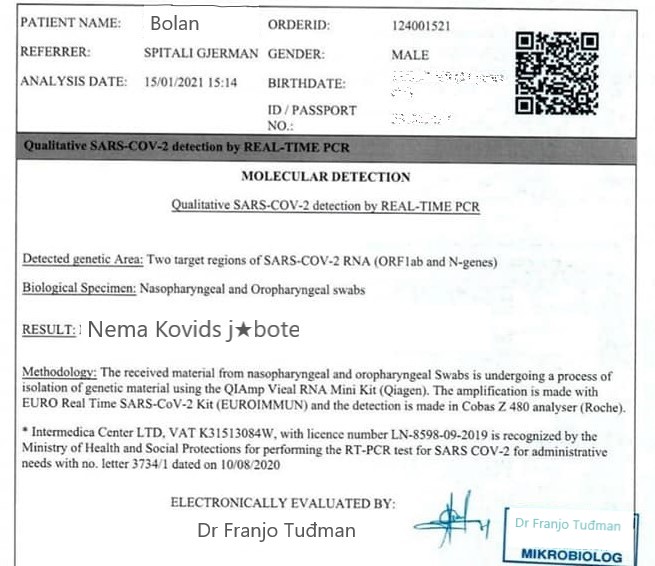
"At the Stara Gradiška border crossing, police officers determined that 43 persons, mostly citizens of Bosnia and Herzegovina, presented fake PCR tests issued in BiH at the border control. At the Slavonski Brod border crossing, two people were registered who gave forged tests," the Brod-Posavina police reported.
Police officers file criminal charges against all those suspected of committing the criminal offence of forgery of a document with the Municipal State Attorney's Office in Slavonski Brod. If found guilty, such persons face up to three years in prison.
The overall number of people detained on Croatia's border with fake PCR tests this weekend could actually be higher - the figures of 45 persons detained with fake PCR tests were released by the police of just one county in Croatia - Brod-Posavina County. A further eight Croatian counties exist along the border with Bosnia and Herzegovina. Each has border crossings between the two countries.
Global Terrorism Index 2020: Croatia is a Completely Safe Country
ZAGREB December 2, 2020 – Croatia is a completely safe country, according to the latest figures from the Global Terrorism Index
According to the Global Terrorism Index, Croatia is a completely safe country. Their findings are reported annually by the Institute for Economy and Peace. In their most recent report (published late November 2020), from the year beginning 2018 and ending in 2019, Croatia scored an index rating of 0.0 on the impact of terrorism. This means that, in regards to the threat of and the fallout from terrorism, Croatia is a completely safe country.
In the report, terrorism affects most the citizens of three countries: Afghanistan, Iraq and Nigeria. Terrorist groups are powerful and active in these three nations. On a daily basis, they affect and change the lives of all the people who live in these countries, particularly those who inhabit larger population centres.
The situation is particularly tragic in Afghanistan (with an index rating of 9.5). 41% of all fatal victims of terrorist globally live in that one country alone. The second country most-affected on the list is Nigeria with 9%. Afghanistan and Nigeria were the only two countries which each suffered more than 1,000 deaths from terrorism.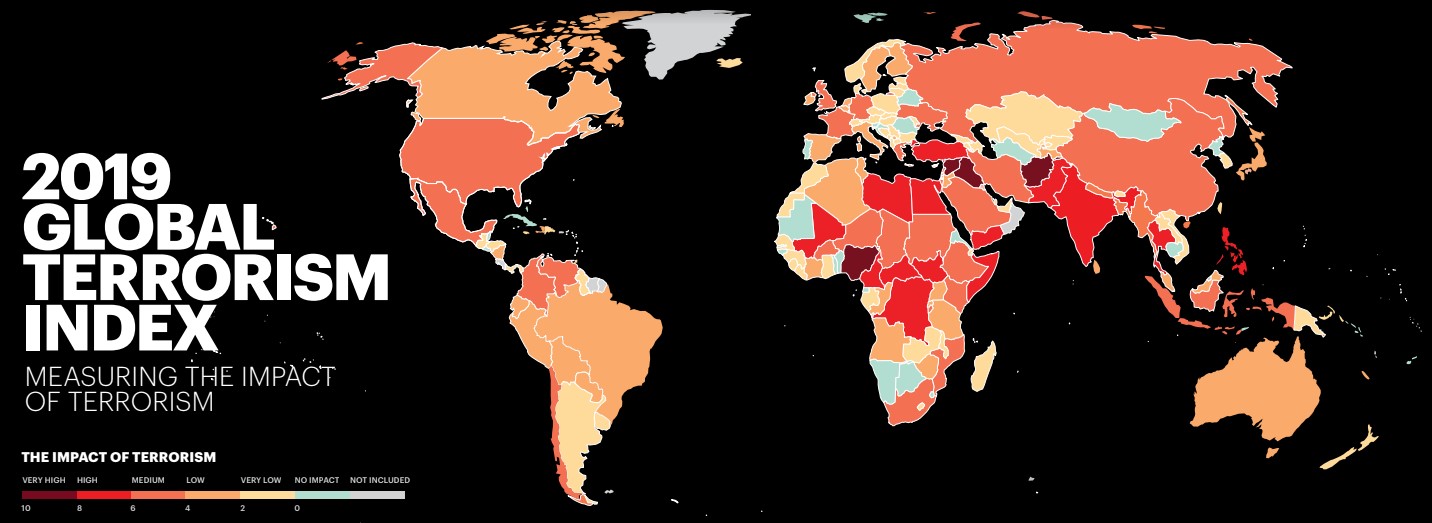 A map showing the impact of terrorism globally. The figures were compiled in a one year period between 2018 and 2019, published as an annual report in late November 2020 © Institute for Economy and Peace (IEP)
A map showing the impact of terrorism globally. The figures were compiled in a one year period between 2018 and 2019, published as an annual report in late November 2020 © Institute for Economy and Peace (IEP)
Globally deaths from terrorism fell for the fifth consecutive year in 2019 to 13,826, a 15 per cent decrease from the prior year. The peak of deaths from terrorism occurred in 2014 and this coincides with the high point of influence of the Islamic State of Iraq and the Levant (ISIS or ISIL). The figures from 2019 show a decrease of 59% since then.
A total of 63 countries recorded at least one death from terrorism in the most recent report. Although dismal reading, this is in fact the lowest number of countries to have reported such since 2013.
The global economic impact of terrorism was US$16.4 billion in the twelve-month period covered by the report, a decrease of 25 per cent from the previous year. However, the true economic impact of terrorism is much higher as these figures do not account for the indirect impact on business, investment, and the costs associated with security agencies in countering terrorism.
ISIS (or ISIL)'s centre of activity has been shown to have moved to sub-Saharan Africa in the period. Total deaths by ISIL in the region have increased by 67%. ISIL and their affiliates were also responsible for attacks in 27 countries in the year period ending 2019.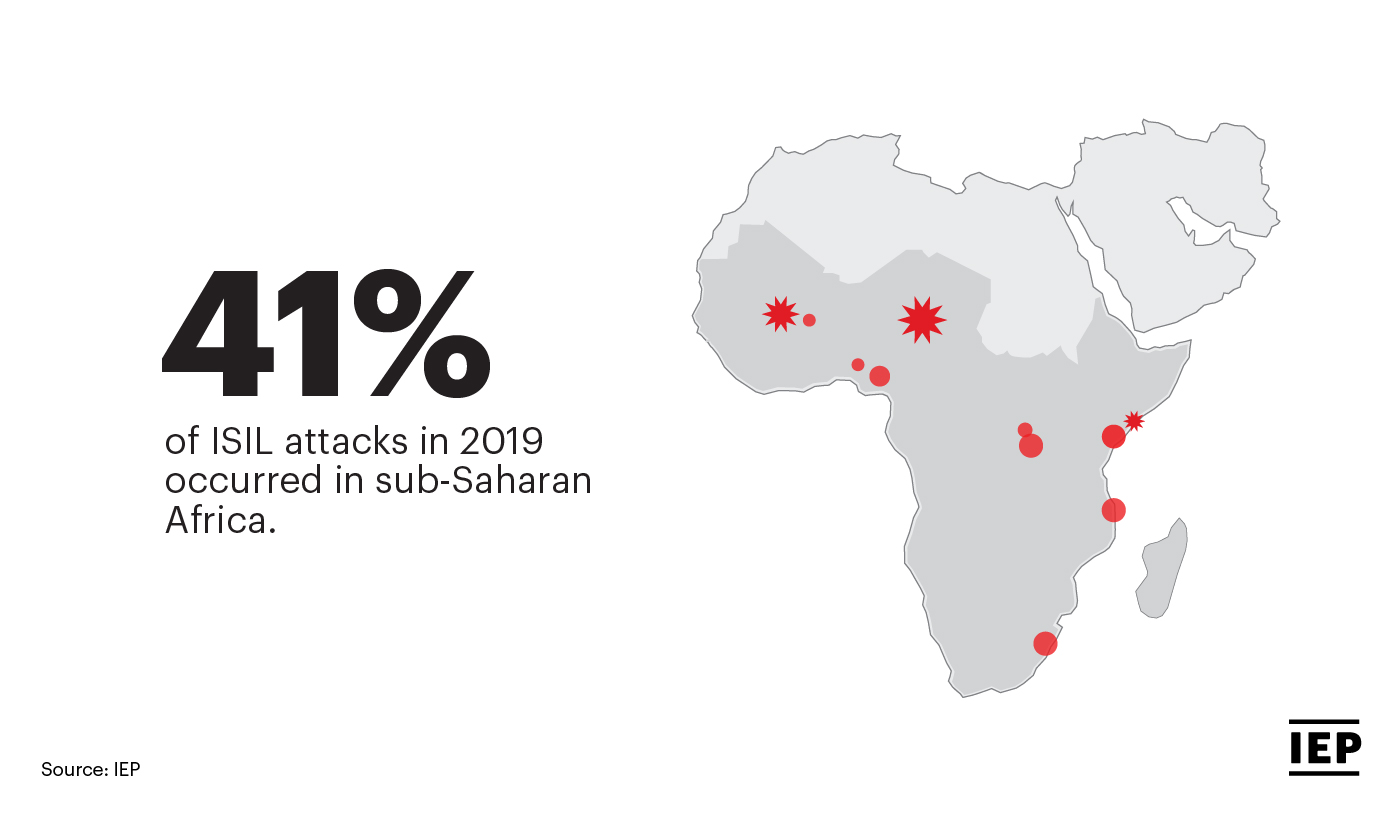 © Institute for Economy and Peace (IEP)
© Institute for Economy and Peace (IEP)
The GTI uses a number of factors to calculate its score, including the number of incidences, fatalities, injuries and property damage. The Taliban remained the world's deadliest terrorist group in 2019; however, terrorist deaths attributed to the group declined by 18%. ISIL's strength and influence also continued to decline. For the first time since the group became active, it was responsible for less than a thousand deaths throughout the year.
It is not yet known whether the attack on government buildings in Zagreb in 2020 will affect Croatia's rating on the index published next year. Although a lone endeavour, Croatian Prime Minister Andrej Plenković is the most high-profile commentator (of many) to have said the attack had elements of terrorism. The global increase in threat from domestic attacks is clearly evident within the rest of the most recent report.
In North America, Western Europe and Oceania, terrorist attacks by groups or individuals involved in far-right politics have increased by 250 per cent since 2014. They are now higher than at any time in the last 50 years. There were 89 deaths attributed to far-right terrorists in 2019. In the USA, white supremacists and other rightwing extremists have been responsible for 67% of domestic terror attacks and plots so far this year.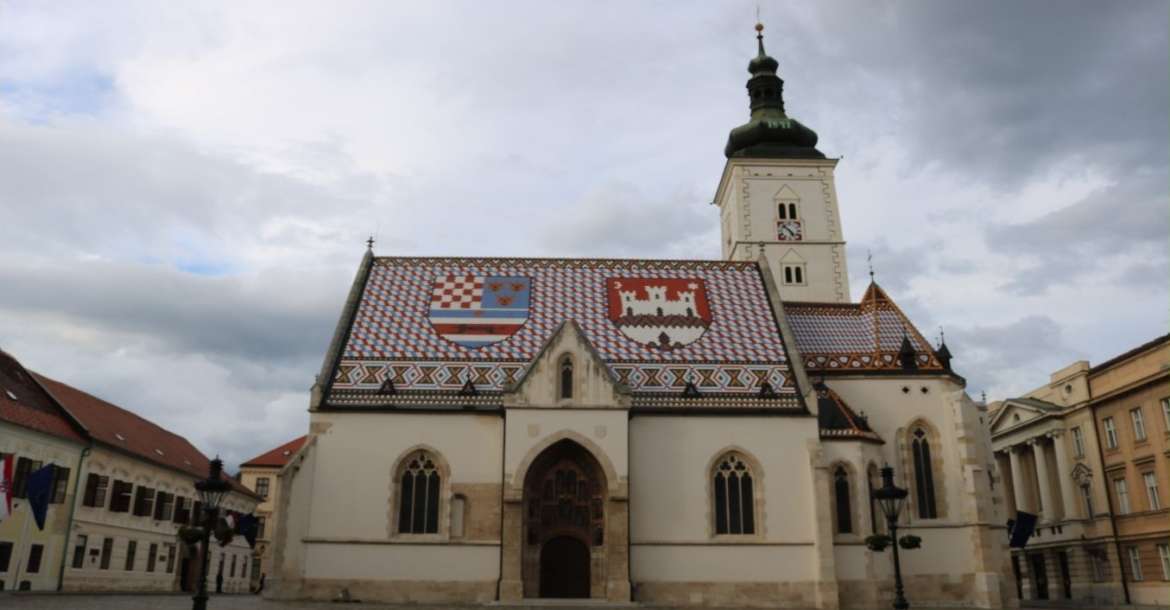 Saint Mark's Square in Zagreb, scene of a shooting in 2020, perpetrated by a Croatian citizen © Marc Rowlands
Saint Mark's Square in Zagreb, scene of a shooting in 2020, perpetrated by a Croatian citizen © Marc Rowlands
There have so far not been any terrorist actions attributable to fundamentalist Islamic groups in Croatia, unlike other European countries such as Spain, Germany, France and the UK. Eastern and southern Europe have experienced more civil unrest in direct correlation with the rise of far-right politics in the region. The popularity of far-right politics has risen ever since the 2008 financial crisis and has continued through the economic recession which followed.
Such trends are expected to continue because of the anticipated and extended economic downturn caused by COVID-19, which is likely to increase political instability and violence. Since COVID-19 was declared a global pandemic by the World Health Organization (WHO) in March 2020, preliminary data suggests a decline in both incidents and deaths from terrorism in most regions in the world. However, it is expected that the pandemic is likely to present new and distinct counter-terrorism challenges.
Of Croatia's neighbours, Bosnia and Herzegovina recorded the largest improvement in the whole of Europe with their 2019 index rating (followed by Austria and Sweden). Only two terrorist attacks were recorded in the country in 2019, compared to six the previous year. Slovenia also scored a 0.0 rating, meaning it can say that it, like Croatia is a completely safe country.


